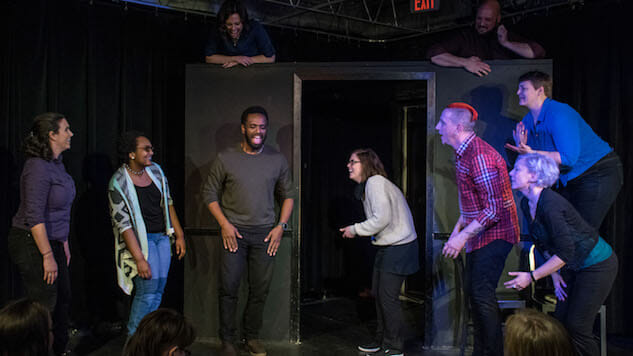6 Improv and Sketch Theaters that Pay Performers
Photos of HUGE Theater via Adam Iverson Photography
Every day comedy producers across America do the impossible: pay improvisers and sketch comedians. They do this in a number of ways, and probably no two paying companies are exactly alike. Some are for-profit theaters that sell tickets, drinks and comedy classes. Others are nonprofit theaters that complement those revenue streams by fundraising from institutional grant-givers and individual donors. Some rent or own their own buildings, while others lease out space from larger organizations; some sell booze, while others are in Pennsylvania. All share the same, simple belief that those who write and perform comedy should be paid for their labor, even if it’s a token amount. And all share a mission to foster safe, inclusive communities that create great, original, artistically adventurous work. Here’s how they do it.
Good Good Comedy Theater
Philadelphia, PA
When Aaron Nevins and Kate Banford launched Good Good Comedy Theater in 2016, paying talent was already in their ethos. The theater grew out of a comedy festival they had produced since 2014: Five Dollar Comedy Week, a week of 30 new shows whose proceeds they split with individual show-runners. Good Good currently gives show-runners a percentage of ticket sales, plus 100% of audience donations solicited post-show, to divvy among their casts or stand-up lineups. Nevins and Banford would not disclose exactly what that first percentage is, but they emphasize that it increases each year. “A big part of our philosophy has always been to pay people, and that it’s fair to pay people, and it should be expected,” says Nevins.
Good Good’s black box theater hosts up to four shows a night every Thursday through Sunday, usually priced from $5 to $16. Productions are drawn from an open submission process—anyone can email the theater to pitch a show—and occasionally solicited.
Arcade Comedy Theater
Pittsburgh, PA
Michael Rubino founded Arcade Comedy Theater with four other artists in 2013. It spent four years in what he calls a “humble storefront” before moving into its current building in the city’s cultural district, where it produces up to five shows a night, four nights a week. The lineup is largely a mix of house teams cultivated from classes, stand-up showcases and outside shows curated through an open submission process. For each show, the first $50 in ticket sales goes to the house manager and technician; the theater pays 40% of what remains to the show-runner or host. “On average, I think it’s a little over 20 to 24% of our annual revenue is performer/producer payouts,” Rubino says. “I think it’s important, and I think it incentivizes artists to promote their shows.”
A 501c3 nonprofit, Arcade has three primary revenue streams: It raises money from foundations like the Allegheny Regional Asset District, sells tickets ($12 a pop, $7 for students) and offers classes ($110-$225, depending on length). So far those latter two categories account for most of the theater’s revenue, as Arcade’s developmental efforts are relatively young. “Thankfully the Pittsburgh community loves comedy,” Rubino says. “We always break even.”
-

-

-

-

-

-

-

-

-

-

-

-

-

-

-

-

-

-

-

-

-

-

-

-

-

-

-

-

-

-

-

-

-

-

-

-

-

-

-

-








































